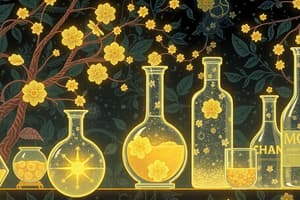Podcast
Questions and Answers
What is the main focus of organic chemistry?
What is the main focus of organic chemistry?
- Studying carbon-containing compounds (correct)
- Exploring chemical reactions
- Analyzing chemical substances
- Understanding molecular behavior
Which of the following is NOT a type of chemical reaction?
Which of the following is NOT a type of chemical reaction?
- Double displacement
- Synthesis
- Decomposition
- Combination (correct)
What does the Law of Conservation of Mass state?
What does the Law of Conservation of Mass state?
- Mass is neither created nor destroyed (correct)
- Mass is lost in chemical reactions
- Mass can be created and destroyed
- Mass is dependent on temperature
What is the purpose of analytical chemistry?
What is the purpose of analytical chemistry?
Which of the following best describes an element?
Which of the following best describes an element?
What is molarity a measure of?
What is molarity a measure of?
Which branch of chemistry deals with the study of metal and minerals?
Which branch of chemistry deals with the study of metal and minerals?
What is Avogadro's Principle concerned with?
What is Avogadro's Principle concerned with?
Flashcards are hidden until you start studying
Study Notes
Overview of Chemistry
- Definition: The study of matter, its properties, composition, structure, and the changes it undergoes during chemical reactions.
Branches of Chemistry
-
Organic Chemistry
- Focuses on carbon-containing compounds.
- Includes hydrocarbons, alcohols, acids, and polymers.
-
Inorganic Chemistry
- Studies inorganic compounds, not based on carbon-hydrogen bonds.
- Includes metals, minerals, and coordination compounds.
-
Physical Chemistry
- Combines principles of physics and chemistry.
- Explores how matter behaves on a molecular and atomic level.
-
Analytical Chemistry
- Involves analyzing substances to determine their composition and structure.
- Techniques include chromatography and spectroscopy.
-
Biochemistry
- Studies chemical processes within and related to living organisms.
- Includes metabolism, enzymology, and genetic information.
Important Concepts
-
Atoms and Molecules
- Atoms: Basic units of matter; consist of protons, neutrons, and electrons.
- Molecules: Two or more atoms bonded together.
-
Elements and Compounds
- Elements: Pure substances consisting of one type of atom (e.g., Hydrogen, Oxygen).
- Compounds: Substances formed from two or more elements chemically bonded (e.g., Water, NaCl).
-
Chemical Reactions
- Processes that transform substances through breaking and forming chemical bonds.
- Types of reactions: synthesis, decomposition, single displacement, double displacement, and combustion.
-
The Periodic Table
- Organizes elements by increasing atomic number and similar chemical properties.
- Divided into groups (columns) and periods (rows).
Key Laws and Theories
- Law of Conservation of Mass: Mass is neither created nor destroyed in a chemical reaction.
- Atomic Theory: All matter is composed of atoms, indivisible and indestructible particles.
- Avogadro's Principle: Equal volumes of gases at the same temperature and pressure contain equal numbers of molecules.
Common Chemical Calculations
- Molar Mass: The mass of one mole of a substance; calculated from the periodic table.
- Stoichiometry: The calculation of reactants and products in chemical reactions based on balanced equations.
- Concentration: The amount of substance per unit volume; commonly measured in moles per liter (Molarity).
Safety and Precautions
- Use personal protective equipment (PPE) such as gloves, goggles, and lab coats.
- Be aware of material safety data sheets (MSDS) for handling hazardous substances.
- Follow proper waste disposal methods for chemicals.
Applications of Chemistry
- Medicine: Development of pharmaceuticals and medical treatments.
- Industry: Creation of materials like plastics, metals, and fertilizers.
- Environmental science: Understanding chemical processes in ecosystems and pollution control.
Overview of Chemistry
- Chemistry is the science of matter, its characteristics, composition, structure, and the changes it undergoes during chemical reactions.
Branches of Chemistry
- Organic Chemistry focuses on carbon-containing compounds, including hydrocarbons, alcohols, acids, and polymers.
- Inorganic Chemistry studies compounds without carbon-hydrogen bonds, including metals, minerals, and coordination compounds.
- Physical Chemistry combines physics and chemistry exploring how matter behaves at the molecular and atomic levels.
- Analytical Chemistry analyzes substances to determine their composition and structure, using techniques like chromatography and spectroscopy.
- Biochemistry studies chemical processes within and related to living organisms, including metabolism, enzymology, and genetic information.
Important Concepts
- Atoms and Molecules
- Atoms are the basic building blocks of matter, composed of protons, neutrons, and electrons.
- Molecules are formed when two or more atoms bond together.
- Elements and Compounds
- Elements are pure substances composed of only one type of atom, such as hydrogen or oxygen.
- Compounds are formed when two or more elements chemically bond, like water (H2O) or salt (NaCl).
- Chemical Reactions
- They are processes that transform substances by breaking and forming chemical bonds.
- Types of reactions include synthesis, decomposition, single displacement, double displacement, and combustion.
Key Laws and Theories
- Law of Conservation of Mass: Mass is neither created nor destroyed during a chemical reaction.
- Atomic Theory: All matter is composed of atoms, indivisible and indestructible particles.
- Avogadro's Principle: Equal volumes of gases at the same temperature and pressure contain an equal number of molecules.
Common Chemical Calculations
- Molar Mass: The mass of one mole of a substance, calculated using the periodic table.
- Stoichiometry: The calculation of reactants and products involved in chemical reactions based on balanced equations.
- Concentration: The amount of substance per unit volume, commonly measured in moles per liter (Molarity).
Safety and Precautions
- Use personal protective equipment (PPE), like gloves, goggles, and lab coats, during chemical handling.
- Be aware of material safety data sheets (MSDS) for handling hazardous substances.
- Follow proper waste disposal methods for chemicals.
Applications of Chemistry
- Medicine: Development of pharmaceuticals and medical treatments.
- Industry: Production of materials like plastics, metals, and fertilizers.
- Environmental science: Understanding chemical processes in ecosystems and pollution control.
Studying That Suits You
Use AI to generate personalized quizzes and flashcards to suit your learning preferences.




